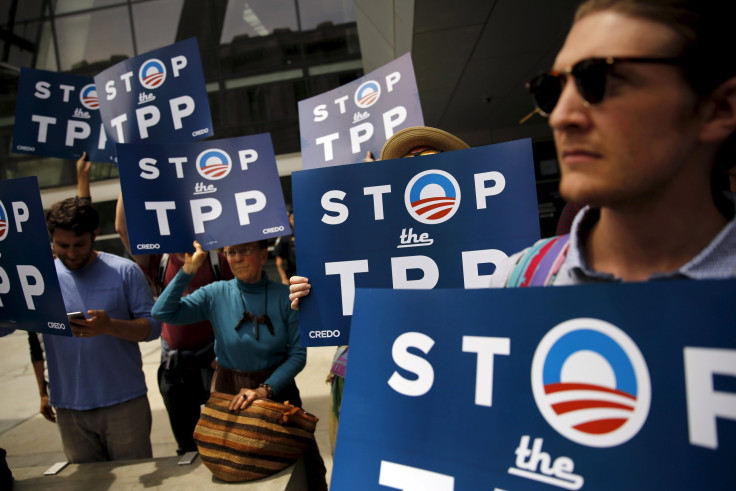Trans-Pacific Partnership: US Waters Down Corporate Investor Lawsuit Options In TPP Trade Agreement

Hidden deep within the voluminous text of the Trans-Pacific Partnership deal is a small, quiet victory for the thousands of people who protested the trade pact. The United States agreed to water down a much-debated proposal that lets corporations sue governments for alleged violations of the deal. The provision has become a rallying point for critics of the Trans-Pacific Partnership including Sen. Elizabeth Warren, D-Mass., and many environmental groups.
Like virtually hundreds of other agreements that cover investment, the Trans-Pacific Partnership allows companies to seek monetary damages from governments that violate the rules. But this one, in response to pressure from free-trade critics, includes caveats and exemptions that will complicate future lawsuits, according to the text of the agreement released Thursday.
“If you add all these things together, none is earth-shattering,” said Michael Smart, a vice president at Rock Creek Global Advisors. “But taken together, it puts a thumb on the scale that will ease the way for governments to defend their actions.”
The weakening of so-called investor-state dispute settlement will ensure the U.S. administration, which is seeking congressional approval of TPP before President Barack Obama leaves office, will get criticized from both sides. Critics will insist the very presence of arbitration in the deal is a giveaway to new corporations from TPP countries while supporters of the agreement, including Republicans, are likely to complain Obama gave up on something that’s been part of U.S. treaties since 1945.
Celeste Drake, a trade and globalization policy specialist at the AFL-CIO labor federation said the arbitration procedure is one reason why the labor federation will oppose the TPP. “I don’t believe it has gotten rid of the problem,” Drake said.
The release of the text is the starting gun for Obama’s bid to persuade Congress, including enough members of his own Democratic party -- which is badly split on the agreement -- to approve the pact next year, with presidential election cycle in full swing. Congress barely approved the enhanced negotiating authority, known as fast track because it provides for a quick up-or-down vote without amendments, that Obama sought to finalize the deal.
U.S. Trade Representative Michael Froman, who wrapped up the TPP negotiations in Atlanta Oct. 5, immediately hit the road to sell the agreement in Norfolk, Virginia, a major port on the U.S. East Coast.
“By guaranteeing American workers, farmers and businesses unprecedented access to vital markets in the Asia-Pacific region -- including by cutting over 18,000 different taxes that other countries impose on American exports -- that’s exactly what the Trans-Pacific Partnership does.”
Foreshadowing the main thrust of the U.S. administration’s argument to members of Congress, Froman touted Virginia’s exports to the countries in the TPP deal. In 2014, Virginia exported an estimated $19.3 billion in goods in 2014, 35 percent of those exports went to TPP countries, according to Froman’s office.
A study by the Center for Strategic and International Studies in January found companies attempted to use the procedure to challenge domestic laws, mostly unsuccessfully. About a third of the cases were settled before arbitration, and governments won 45 percent of the time. Companies won the remaining 22 percent, but obtained damages for a small fraction of what they’d sought.
Nevertheless, the nature of the cases brought has fired political opposition around the world, and even brought the issue into popular culture. Comedian John Oliver featured the issue in a show this year.
A Canadian company sought to change a California clean-air regulation through the North American Free Trade Agreement in 1999. Tobacco company Philip Morris has taken aim at health rules in Australia and Uruguay. A U.S. chemical company won $13 million of the $250 million it sought over a Canadian ban on a gasoline additive.
The final TPP text makes several tweaks that will make it far less likely to result in successful lawsuits, according to Todd Weiler, a Toronto lawyer who specializes in investment treaty arbitration.
The Asia-Pacific pact is “definitely a tightening of the legal standards that existed in NAFTA,” Weiler said.
In one part, the TPP makes it harder for investors to bring lawsuits based on their “expectations” of profits they would have made under an investment. That word might have let companies sue over legitimate measures a country takes to protect public health or the environment on the grounds unexpected changes reduced the value of investments.
Drake of the AFL-CIO said the tightening of the legal language isn’t enough because arbitrators are “free to ignore” the subtle caveats U.S. negotiators add to the text. “Without access to an appeals process, their mistakes can’t be fixed,” Drake said.
The agreement would also bar the use of shell companies to bring cases, an issue that arose when Philip Morris used a Hong Kong-based subsidiary to sue Australia. More directly, it all but carves the tobacco industry from being able to use arbitration.
Ilana Solomon, director of the Sierra Club’s Responsible Trade Program, said the exemption for tobacco shouldn’t be the end of the matter. “If it applies to tobacco, why shouldn’t it apply to environmental policies?” Solomon said. “It’s not sufficient to carve out one sector.”
© Copyright IBTimes 2025. All rights reserved.




















